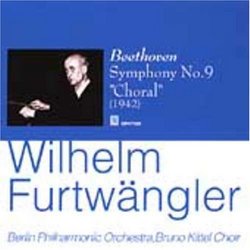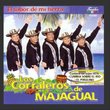| All Artists: Ludwig van Beethoven, Wilhelm Furtwängler, Elisabeth Höngen, Berlin Philharmonic Orchestra, Tilla Briem, Peter Anders Title: Beethoven: Symphony No. 9 "Choral" Members Wishing: 0 Total Copies: 0 Label: Opus Kura Release Date: 1/25/2005 Genre: Classical Styles: Historical Periods, Classical (c.1770-1830), Modern, 20th, & 21st Century, Symphonies Number of Discs: 1 SwapaCD Credits: 1 UPCs: 034061770039, 4582158687037 |
Search - Ludwig van Beethoven, Wilhelm Furtwängler, Elisabeth Höngen :: Beethoven: Symphony No. 9 "Choral"
 | Ludwig van Beethoven, Wilhelm Furtwängler, Elisabeth Höngen Beethoven: Symphony No. 9 "Choral" Genre: Classical
|
Larger Image |
CD DetailsSimilar CDs |
CD ReviewsInsecure pitch music appreciator | Portland, OR | 03/20/2007 (3 out of 5 stars) "Just got this after hearing that Opus Kura had secured a superior master to the more widely circulated version by among others Music & Arts. Very disappointed as there are serious issues with wavering and incorrect pitch. For example, the 3rd movement has wavering pitch, and is overall slightly flat. As a result, the movement is 1.5% longer than it is on the Music & Arts CD (20'22" vs 20'07" from beginning note attack to decay of final note). Also, there is an odd compression during loud passages, that by my taste sounds better less compressed albeit a little distorted on the Music & Arts CD. This is arguably the greatest recording of this work, and I would have to recommend the Music & Arts remastering." A Terrifying and yet Uplifting Ninth, by the Greatest Beetho Ralph J. Steinberg | New York, NY United States | 05/07/2005 (5 out of 5 stars) "As is well known, if not always acknowledged, Wilhelm Furtwangler was the only major German musician who remianed in Germany during the Nazi period BECAUSE he opposed the regime, particularly its anti Semitic policies, as well as its degradation of German art. This "Choral" Symphony therefore may be considered to be Furtwangler's lonely protest against the Hitler gang.
Before discussing the performance, I should like to say that no other issue of this performance has the fullness of sound as this Opus Kura transfer, made, I understand, from Melodiya LP sources, which derive from the original RRG tapes. There is still some distortion in the First Movement, but it is much reduced and the sound has an absence of shrillness quite unlike other transfers. The First Movement is darker, heavier, more tragic and grimmer than any other, including Furtwangler's other Ninths. All tempo modificatonis are done so smoothly and subtly that one might less notice them than feel them, so naturally do they fit in. The thunderous roar of the Recapitulation (actually, more like a further development, as in the correspponding Bruckner Symphony) is thoroughly frightening, much like Weingartner's, but broader. The coda, a second development, is marked by a gradual increase in tempo during the repeated fragments of the main theme, followed by a gradual rallentando during the solo horn passages, with the Basso Ostinato beginning ghostly and incrasing to a shattering climax, as terrifying as that of the Bruckner Ninth. The Scherzo is more maniacal, demonic in its fury, with a Trio that is broader and more songful than most, although still a Presto. The accelerations in the Scherzo are totally spontaneous and natural. The Adagio is perhaps the broadest ever, and perfectly sustained, mainly because of the seamless phrasing. The Andante has never sounded as poignant as this. Everything in this movement is managed with a delicate, subtle hand, which makes this 20+ minute movement seem all too brief. The Finale is nothing less than orgiastic in its near-hysterical power and intensity. Although the solo quartet cannot equal Weingartner's, it is actually quite good, especially the tenor Peter Anders; only Tilla Briem's top notes disappoint. Furtwangler's tempi for the fast sections are probably faster than anyone else's, but this arises from his spontaneous feeling, and not a desire to be different for difference's sake. The Coda's Prestissimo has to be heard to be believed; how any orchestra can play at such a fast tempo and still articulate the notes is a wonder to me. Here is an "Ode to Joy" with sheer elemental force. There are very few recordings that I regard as essential; this is one of them. I have read other reviews of this Ninth in other tranfers, some saying that buyers looking for one Ninth should make it this one,calling it the single greatest classical music recording ever made. I now have to agree. I would never want to part with the live Klemperer from '57, the Fricsay, or the fabulous Weingartner, nor some of the latter Furtwanglers,but, for the ultimate emotional experience of the Ninth as a cleanser of the soul, this is the Ninth to get. Furtwangler remains the greatest of all Beethoven conductors; while great in many composers, he is unreachable in Beethoven. YES, THIS IS THE ESSENTIAL NINTH!" |

 Track Listings (4) - Disc #1
Track Listings (4) - Disc #1